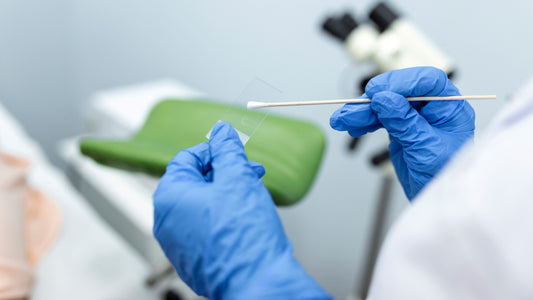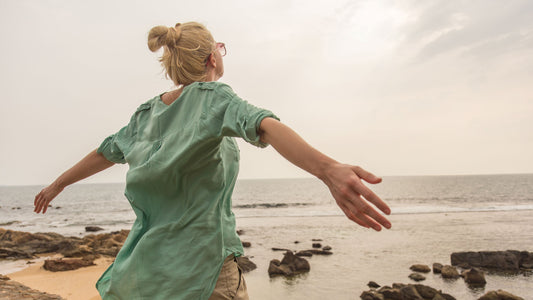I took the opportunity to re-connect with many family friends over the holidays, a tremendous blessing.
But there was a heartbreaking, underlying theme to some of these visits. Several friends had become caregivers. Most for elderly parents.
All were still clearly trying to adjust to this sometimes overwhelming new role. You could see the sheer exhaustion on their faces as they tried to fit this new role into an already overcrowded day.
And yes, they asked a lot of questions about my own experiences as a physician, daughter, and caregiver.
Most of you know that along with being a mother of 5, I was my father’s caregiver for many years.

We lost him recently, but he had a long, happy life full of love. Over his final dozen or so years, our family had become his team of caregivers – there for him like he was always there for all of us throughout our lives.
One of my caregiving contributions was also in my being a physician focused on anti-aging! I could oversee his medical treatment (offering my “polite opinion” to his medical team when necessary) and I could also focus on improving his health with my own best holistic recommendations (needless to say he was a Mighty Maca fan).
My time with him was so special those final years. I wouldn’t have traded that time for anything.
But yes, I do remember it. Those days when the stress would just overshadow everything.
So today I wanted to share a few of the articles that I have written, and a couple of lovely video interviews, on the topic of caregiving. These are some of my favorites, and I hope you will carve out some downtime for yourself and read and listen to them. I pray that they will touch your heart – and help you in your own caregiving journey – in some small way.
There are several truths of caregiving, and one is that you absolutely need to care for yourself before you can truly take the best care of someone else.
The Significant Benefits To Your Loved One When You Also Focus On Self-Care
Caregivers are under intense chronic stress. It can be physical, emotional, mental, financial as well as spiritual. They want to provide the best for their loved one, every day and every moment. They can experience tremendous guilt (like when they finally take off their caregiving hat to do other things… like work or care for the rest of their own family…or care for themselves) and growing isolation. It is hard to feel like you are now “the parent” of your own elderly mother or father. It is hard to ask for help.
And sometimes we get so caught up in providing the very best and focused “care”…that we actually end up missing out on relishing those final moments spent with our loved one.
Years ago when my father was 89 and in the hospital, I wrote a letter about caregiving with specific advice relating to ensuring self-care. That letter is below and I hope you’ll find a few recommendations that can help.
I’m also including an interview that I did a few years ago with a lovely woman named Laura Steward relating to the importance of feeling empowered to talk with your loved one’s medical providers, to ask questions, get second opinions, do your own research, ask for help, and much more.
There are many practical caregiving jewels in this interview.
Advice From A Physician, Caregiver, And Daughter
From an earlier post:
I am writing you from the hospital at the bedside of my 89-year-old father. He has had a rollercoaster of a ride over the past month and us along with him. This has been a journey to the end of life and back again, as he is doing better, for which I am grateful!
In this same realm, I met with other caregivers and they shared with me their intense stress, exhaustion, and grieving. The emotions they shared with me were hard to comprehend. One woman was the caregiver for both parents through death and the other currently at the bedside of her husband of 35 years who has been in home hospice for several months.
I really had no concept of what this meant and only now have a glimpse of the gravity based on my last two weeks caring for my own father in a very fragile state. For myself, I first am relieved that my dad was with me when he became ill. He had gotten out of the hospital 2 days before he drove himself to the Philly airport and flew down here. The first week he was doing better each day and we had him walking to the St. Simons Island Pier. Then he missed his morning dose of medications, became very short of breath and I hospitalized him. This reinforced for me how fragile this tough ex-Navy man has really become.
It also emphasized how quickly sleep deprivation and worry take a toll on our body, emotions, and spirit.
I wanted to take this opportunity to reach out to other caregivers and first send you blessings and prayers for your role and this immense responsibility.
In the meantime, as a message to caregivers, permission and a plea for you to find a balance and take care of yourself, guiltlessly. You know when you are on board an airplane, the stewardess says “Put your oxygen mask on first, then put it on your little loved one.”


First: Call in the troops. Ask for help. This may be very hard to do but do it. Maybe it’s for a few hours a day or week. Ask your church community for help or volunteers. YOUR TIME is very important. Maybe it’s an escape time on a drive or long walk or long bath. Or listening to music in your car (as long as it’s not in your garage with the door closed and engine on!)
The other issue if you don’t ask for help is that you grow more and more isolated…which leads to even more stress!

Second: Sleep. Still a number one therapy. Please allow yourself this time. If you need some help with this, check out these tips to getting a better night’s sleep (and refer back to the earlier point on asking for help! you might need someone to spend the night or give you a little break during the day for a nice nap or some meditation time).

Third: Support your adrenals. Really this is our entire hormonal axis we must support. When we are pushed to our physical and mental limits due to lack of sleep, worry and stress our hormone network moves into a survival mode. This can lead us to experience anxiety, depression, aches and pains, intense fatigue or hyperactivity, and resentment. Click here to learn more about what stress does to our adrenals.

Something to remember: Resentment is lack of self-care!

Fourth: Supplements for adrenal support (always discuss new supplements with your physician):
- Adrenal adaptogens: Maca, Ashwagandha, Siberian ginseng, Rhodiola Rosea
- Must have foods: Brazil nut, oysters, salmon, avocado, greens
- DHEA: 5-15 mg for women, 25 – 50 mg for men.
- High-quality multivitamin and minerals with bio-available B vitamins and high dose Vitamin C. I often recommend 4000IU of Vit C and up.
- My core recommendation to patients with adrenal stress is:
- Daily Vitality Packs with Calcium (Albion micronutrients & chelated minerals, Omega -3’s, antioxidants, MCHC calcium with magnesium and vitamin D) Two packs per day
- Vitamin C 2000 – 5000 mg per day
- Carnitine 2000 – 6000 mg per day to improve energy production
- Mighty Maca® Plus green drink (alkalinizing program, takes stress off the kidneys to balance pH)
- Alpha Lipoic Acid 300 mg per day to help with blood sugar control
- Possibly also: Phosphatidylserine, Mood food, Magnesium, 5 HTP, inositol, and thyroid support
Mental Detoxing And Positivity Can Also Help You
A note about emotional pain: You can have the perfect diet, the perfect exercise schedule and do everything possible to create recovery; but if you have lingering unresolved emotional conflicts, you can remain or become very sick.
Aristotle said:
“The soul suffers when the body is diseased or traumatized, while the body suffers when the soul is ailing.”
You’ve heard the phrase: “You are what you eat.” Well, it should be added that “You are also a product of how you address your life’s conflicts.” Your physical health is a direct manifestation of the various conflicts you’ve faced throughout your lifetime, along with your reaction to them. Therefore, set intentions to see life’s negative experiences as positive growth for your life and a part of your ultimate being.
Realize that along life’s path, you will meet resistance. Embrace this resistance as an opportunity for self-growth. Realize that God never wastes a hurt. Remember that positive thoughts and actions create happier people and HAPPY PEOPLE are HEALTHY PEOPLE!
Get Your Zen On
I’m also providing the link to a lovely video interview that I did with one of the most amazing, caring men that I know. Pedram Shojai is that man and I hope you will listen to his discussion about how important it is for us to get our Zen on and take care of ourselves prior to focusing on others.
Final Thoughts (And What I Have Learned From My Own Caregiving Journey)
- Lead with love and respect
- You’re the best advocate your loved one has
- You are a product of how you address your life’s conflicts
- When caregiving, take care of yourself, guiltlessly
- We are not limited by our age (so don’t let a doctor tell you that your loved one has lived a good life and is ready to go!)
- Our spirit never ages
- Live in the day…you never know what tomorrow may bring

Additionally, a longtime writer of mine, Diane Blum, has written a book that could help ease your caregiving stress this holiday. She has written a memoir about the nine years spent caring for her elderly mom in her family’s home. In the book, Caring for Mom and Other Loved Souls, she shares her caregiving journey (which she lovingly refers to as the “blessings and stressings” of caregiving), and she folds in the stories of over a dozen other caregivers (many having a spouse with Alzheimer’s). She shares their insights into what their greatest challenges were, providing helpful and practical advice centered primarily on the emotional and mental struggles of caregiving. It is very inspiring, and beautifully written.
Again, my thoughts are with you.
Cherish this time…
And let me know your strategies relating to caregiving and self-care.



